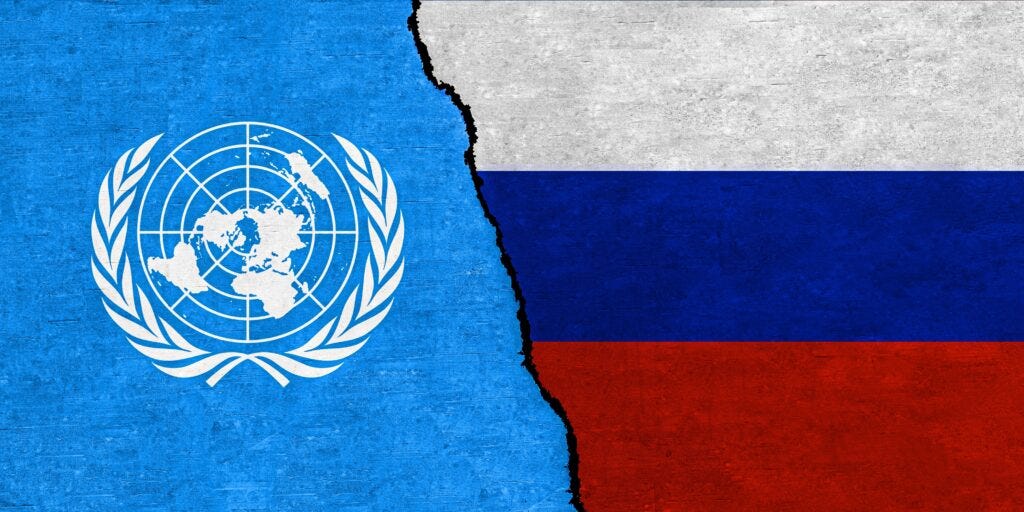Future Pact: Russia blocks full powers of UN Secretary-General
UN will not be able to take global command in an emergency.
Source : https://essentiel.news/pacte-futur-russie-bloque-pleins-pouvoirs-secretaire-general-onu/
On Sunday, September 22, the participants in the opening of the United Nations Future Summit (“UN”) adopted “by consensus” the Pact for the Future and its two annexes. Russia and several countries called “sovereignists” opposed the strengthening of the powers of the UN and its Secretary General, as part of the creation of an “emergency platform” in the event of complex global shocks.
Little enthusiasm
The United Nations on Sunday adopted a “ Compact for the Future ” aimed at addressing 21st century challenges ranging from conflict to climate change to human rights, despite last-minute objections from a group of countries led by Russia, according to a UN press release.
In his opening remarks at the Summit , Secretary-General Antonio Guttierez said the Pact was:
”A unique opportunity to reimagine the multilateral system and set humanity on a new path to meet existing commitments and address long-term challenges.”
The pact sets out 56 "actions," including commitments to multilateralism, respect for the UN Charter and peacekeeping.
It calls for reform of international financial institutions and the UN Security Council, as well as renewed efforts to combat climate change, promote disarmament and guide the development of artificial intelligence.
However, it seems that the enthusiasm of some nations was quite mixed. The signing of the documents even seemed uncertain, until the last minute. According to ABC News , the suspense was such that the Secretary-General of the United Nations , Antonio Guterres, had prepared three speeches: one for approval, one for rejection and a final one in case of a situation in between, said the spokesman of the United Nations, Stephane Dujarric.
Russian rejection
Adoption of the text was briefly delayed when Russian Deputy Foreign Minister Sergey Vershinin tabled an amendment calling for the pact to be rejected, stressing the "principle of non-interference in the internal affairs of states" and urging the UN to avoid duplicating efforts.
Six countries allied with Russia followed suit: Nicaragua, Iran, Sudan, Belarus, North Korea and Syria. Fifteen others abstained, including China, Cuba, Iraq, Laos, Malaysia, Pakistan and Sri Lanka. In all, 22 nations were largely unhappy with the pact.
During the negotiation phase, Mr. Guterres had urged countries to show “vision” and “courage,” calling for “maximum ambition” to strengthen international institutions that are struggling to respond effectively to current threats.
The boldness and ambition in question refer in particular to Action 57 and the proposal to strengthen the powers of the UN in the event of complex global shocks.
Special powers
In the original text of the Pact, subject to a silence procedure in the weeks preceding the Future Summit, Action 57 was formulated as follows:
”We request the Secretary-General to submit for consideration by Member States protocols for the convening and operationalization of emergency platforms based on flexible approaches to respond to a range of different complex global shocks, including criteria for the initiation and gradual withdrawal of emergency platforms.”
This proposal is similar to the articles of the “Pandemic Treaty” which aimed to give the WHO director enhanced powers in the context of declaring health emergencies.
But following the Russian intervention, this Action and the “emergency platform” were removed and replaced by a declaration of intent that maintains the UN and its Secretary in their current role. The following passages from Action 54 express it thus:
”The principles of sovereignty and national consent, equity, solidarity and cooperation will guide our future responses to complex shocks, in full respect of international law.
This includes the Charter and its purposes and principles, existing mandates of the United Nations, its purposes and principles and existing mandates of United Nations organs and processes, entities of the United Nations system and its specialized agencies.
We will maintain the role of the Secretary-General, which includes convening member states, promoting coordination across the multilateral system and engaging with relevant stakeholders in response to crises.
We call on the Secretary-General to consider approaches to strengthen the United Nations system's response to complex global shocks, within existing authorities and in consultation with Member States, that support, complement and strengthen the multilateral system.”
Despite the multiplication of emergencies, the adopted text is therefore “a lowest common denominator” and does not reflect the initial ambition of the project. Furthermore, regardless of its content, the Pact and its annexes are not binding, which of course raises the question of their implementation.
Once again, the attempt by the UN and its agencies to legitimize their role as global governance bodies has failed. But this does not prevent their policies from being adopted and funded by the majority of nations.
The opening session can be replayed on UN Web TV.






Let them try ... until eternity 🤞🤞🤞